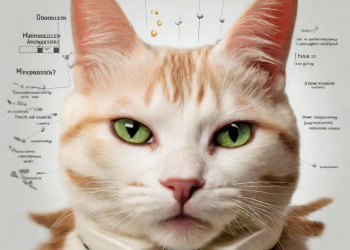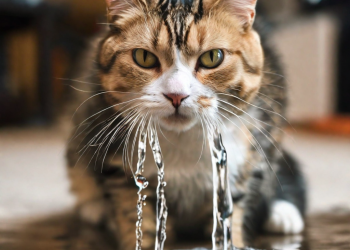When to euthanize a cat with kidney failure?
The decision to euthanize a cat with kidney failure is a difficult and painful situation for any owner. As responsible owners, we want the best for our cats, but we must also consider their quality of life. In severe cases of kidney failure, when the cat is suffering and not responding to treatment, it may be necessary to make the difficult decision to end its suffering. It is always important to consult with a veterinarian and make an informed and loving decision for our cat.
When to euthanize a cat with kidney failure?
The decision to euthanize a cat with kidney failure is a difficult and painful one for any pet owner. However, it is important to know when is the right time to make this decision. In this article, we provide you with information and advice to help you make the best decision for your cat and his well-being. Keep reading to learn more.
Diagnosis of kidney failure in cats
The diagnosis of kidney failure in cats is crucial to be able to provide appropriate treatment to our pet. Below are the methods used to diagnose this disease:
A. Physical examination and blood tests
The veterinarian will perform a complete physical examination to evaluate the cat’s general health. Additionally, blood tests will be carried out to measure urea and creatinine levels, which are key indicators of kidney function.
B. Urine tests
Urine tests are essential to evaluate the concentration of urine, the presence of protein, and the ability of the kidneys to filter waste. These results will provide valuable information about the cat’s kidney health.
C. Other diagnostic methods
In some cases, your veterinarian may recommend ultrasounds or x-rays to obtain detailed images of the kidneys and detect possible abnormalities. These diagnostic methods can help confirm the diagnosis of kidney failure in cats.
When to euthanize a cat with kidney failure is a difficult decision that should be made in consultation with your veterinarian. The results of the examinations and diagnostic tests will be instrumental in evaluating the severity of the disease and determining the best course of action to provide relief to the cat.
Treatment of kidney failure in cats
Treatment of kidney failure in cats is crucial to improving the pet’s quality of life. Here are the different approaches to tackling this disease:
A. Changes in diet
- Recommended foods for cats with kidney failure
- How to prepare a homemade diet for cats with kidney failure
B. Medications
- Medications to control blood pressure
- Medications to control phosphorus levels in the blood
- Medications to stimulate red blood cell production
C. Fluid therapy
- Importance of hydration in cats with kidney failure
- Types of fluids used in fluid therapy
D. Vitamin and supplement therapy
- Essential vitamins and minerals for cats with kidney failure
- Recommended supplements to improve kidney function
When to euthanize a cat with kidney failure is a difficult decision that must be made carefully. It is important to consider the severity of the kidney disease, the presence of other diseases or complications, and consult with your veterinarian before making a final decision.
IV. When is it necessary to euthanize a cat with kidney failure?
The decision to euthanize a cat with kidney failure is extremely difficult and painful for any pet owner. However, there are certain factors and symptoms that should be considered before making this decision.
A. Factors to consider before making the decision to euthanize a cat with kidney failure
- cat age
- Kidney disease severity
- Presence of other diseases or complications
B. Symptoms that indicate that the cat needs to be euthanized
- Uncontrollable pain and discomfort
- Loss of appetite and malnutrition
- Inability to control urination and defecation
- Acute kidney failure
C. Consult with the veterinarian and make the final decision
It is crucial to seek guidance and support from a veterinarian during this difficult time. The veterinarian will be able to provide information and advice to help make the final decision regarding the cat’s well-being.
Palliative care for cats with kidney failure
Palliative care is an important option for cats suffering from advanced kidney failure. This care focuses on improving the cat’s quality of life and providing comfort during this stage of the disease. Here we explain what palliative care is, its benefits and how you can provide it to your cat.
What is palliative care
Palliative care focuses on relieving the cat’s pain and discomfort, as well as meeting its physical and emotional needs. The goal is to provide you with comfort and support during your illness.
Benefits of palliative care for cats with kidney failure
Palliative care can provide several benefits for your cat, including:
- Relief of pain and discomfort
- Improvement in quality of life
- Emotional support for the cat and its owner
How to Provide Palliative Care for a Cat with Kidney Failure
To provide palliative care for your cat, it is important to focus on several aspects of its well-being, including:
- Control of pain and discomfort
- Proper nutrition
- Hygiene and personal care
- Constant monitoring of the cat’s health
Importance of emotional support for the cat owner
It is crucial that the cat owner receives emotional support during this stage, as it can be difficult to see their pet sick. Seeking support from friends, family, or support groups can be a great help in coping with this situation.
Remember that each cat is unique, so it is important to tailor palliative care to your pet’s specific needs. Always consult with your veterinarian for guidance on how to provide the best care for your cat with kidney failure.
SAW. How to deal with the loss of a cat with kidney failure?
Losing a beloved pet can be extremely difficult, especially when trying to deal with the loss of a cat who has suffered from kidney failure. Here are some ways to cope with this difficult time:
A. Grieving process for the loss of a pet
It is important to allow yourself to feel and process the emotions that come with losing a cat. Grief is a natural process and has no defined time frame.
B. Tips for coping with the loss of a cat with kidney failure
- Talk to friends and family: Sharing your feelings with people close to you can be comforting.
- Seeking support from support groups: Finding people who have gone through similar experiences can provide comfort.
- Remembering good times with your cat: Preserving happy memories can help honor your cat’s life.
- Consider adopting another cat in the future: Opening your heart to another pet can be a way to heal.
C. Importance of taking care of mental health during grief
It is essential to take care of your emotional well-being while you grieve the loss of your cat. Seeking professional support if necessary and taking the time you need to heal is crucial.
Remember that everyone experiences grief differently, so don’t compare yourself to others and allow yourself to feel and heal at your own pace.
Prevention of kidney failure in cats
Measures to prevent kidney disease in cats
It is important to take preventive measures to avoid kidney failure in cats. Some of the measures you can take include:
- Proper nutrition: Provide a balanced, high-quality diet for your cat, avoiding foods high in phosphorus and sodium.
- Weight control and exercise: Keep your cat at a healthy weight and encourage physical activity to prevent obesity, which can contribute to kidney problems.
- Visit the veterinarian regularly: Have regular checkups with the veterinarian to detect any kidney problems in early stages.
Importance of detecting and treating other diseases that can affect kidney function in time
In addition to specific preventive measures for kidney failure, it is important to be aware of other diseases that may affect your cat’s kidney function, such as diabetes or hypertension. Treating these diseases early can help prevent kidney damage.
How to monitor your cat’s kidney health at home
To prevent kidney failure, it is helpful to monitor your cat’s kidney health at home. Some ways to do this include:
- Observe your cat’s urination and defecation habits, paying attention to changes in the frequency or amount of urine.
- Monitor your cat’s water intake, as dehydration can affect kidney function.
- Perform urine tests at home if recommended by your veterinarian, to detect the presence of protein or blood in the urine.
By taking these preventive measures and monitoring your cat’s kidney health, you can help prevent the onset of kidney failure and keep your pet healthy and happy.
Conclusions
After reviewing kidney failure in cats in detail, it is important to remember some key points:
A. Recap of the key points of the article
- Kidney failure is a serious disease that affects many cats around the world.
- The symptoms of kidney failure can be subtle at first, so it’s crucial to keep an eye out for any changes in your cat’s behavior or health.
- Early diagnosis and appropriate treatment can improve the quality of life of a cat with kidney failure.
B. Importance of making informed decisions and consulting with a veterinarian if in doubt
It is essential that owners of cats with kidney failure seek professional guidance and make informed decisions about treatment and palliative care for their pets.
C. Reminder that each cat is unique and may respond differently to treatment and palliative care
Each cat is an individual with unique needs and responses. What works for one cat may not be effective for another, so it’s important to be open to adjusting treatment based on your cat’s specific needs.
D. Importance of providing love and care to our cats during their illness
Cats with kidney failure need love, support and special care during their illness. Providing a loving and comfortable environment can make a difference in your overall well-being.
When to euthanize a cat with kidney failure
The decision to euthanize a cat with kidney failure is extremely difficult and should be made with the advice of a veterinarian. Some factors to consider include:
- cat age
- Kidney disease severity
- Presence of other diseases or complications
It is important to consult with a veterinarian to evaluate the cat’s quality of life and make the final decision in an informed and compassionate manner.










